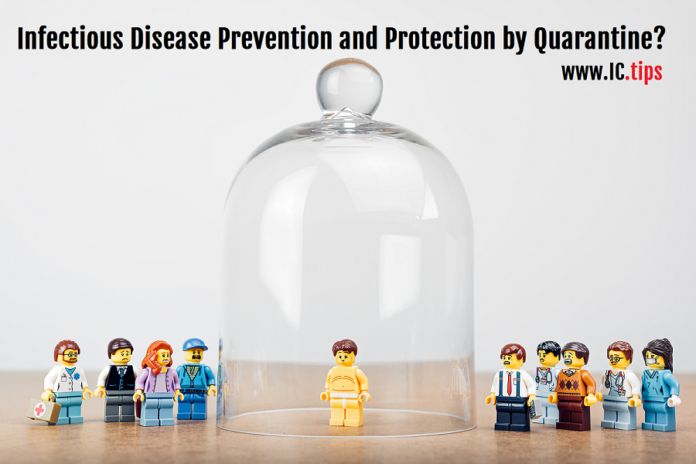The National Academies of Sciences, Engineering, and Medicine has released its publication on “Improving the CDC Quarantine Station Network’s Response to Emerging Threats” (1). This new report offers an interesting insight into the challenges and opportunities facing the CDC Quarantine Station Network that is managed in the USA by the Division of Global Migration and Quarantine (DGMQ) when confronted with a disease outbreak as demonstrated by the Covid-19 pandemic. Quarantine and isolation, according to the CDC, help protect the public by preventing exposure to infectious diseases (2) and in the USA are covered by the “Final Rule for Control of Communicable Diseases: Interstate and Foreign” (2017) as well as other specific regulations.
Quarantine is not a new concept. It formally started with the plague epidemic of 1374-1352 and involved the isolation and separation of people, animals, and goods for 40 days to prevent the spread of disease (3). It should be noted that the word quarantine comes from the Italian word “Quaranta” meaning 40 (4). Over the centuries, physical isolation has been used for numerous disease outbreaks on local, regional, national, and international levels and there is a reason why hospitals use isolation rooms for disease prevention purposes.
While quarantine and isolation requirements are generally seen as useful and appropriate, that viewpoint can quickly change when it affects people personally and becomes mandatory and/or has a significant impact on an individual’s rights and freedom
Now, as many of us experienced one way or the other, isolation and quarantine were used for the last 2 years for Covid-19 and often involved home isolation for days or weeks after you travelled or had contact with a person that was ill. While quarantine and isolation requirements are generally seen as useful and appropriate, that viewpoint can quickly change when it affects people personally and becomes mandatory and/or has a significant impact on an individual’s rights and freedom. One of the many concerns raised during the pandemic was the usefulness and appropriateness of international travel restrictions and bans by countries against other countries (5). Some countries even applied extreme measures based on a “Zero Covid” policy and the recent lockdown of Shanghai is an example with significant consequences for individuals and the community (6).
In the report, the committee looked at many data and responses to the pandemic on a national and international level to assess the effectiveness of the quarantine station network response. It should come as no surprise that findings reflected often heard and seen deficiencies, despite best efforts by the DGMQ and its dedicated staff. These deficiencies are addressed in the report in very specific recommendations made by the committee and involve four key areas: organizational capacity, mitigating the risk of importing infectious diseases, better use and selection of new technology, improving coordination and collaboration on the national and international level, and modernizing CDC’s legal and regulatory authority (1). For details and possible next steps, see the report which can be downloaded from the NAP website (1).
two recommendations are worthwhile highlighting
Now, two recommendations are worthwhile highlighting since they point to current and future problems we will face. Let’s first look at the organizational capacity of the network. It was surprising to me to learn that staffing heavily relied on non-permanent positions and the ability of the network to scale up quickly with staff was significantly impacted by a lack of qualified personnel and funding being available when surge capacity was required. Maybe it shouldn’t be surprising, since similar problems are still found in Canada’s healthcare system right now (7). It is difficult to establish a sustainable model for surge capacity staffing and preparedness. However, as the report highlights, a stable permanent well-trained workforce is essential, combined with long-term funding stability and specific plans to bring in other qualified staff quickly when needed. The other recommendation that will provide for ongoing challenges relates to national and international collaboration. As seen during the Covid-19 pandemic, too many times politics collided with science and trying to have a unified international response is not made easier by significant differences in political beliefs and approaches (8, 9).
Although the NAS report is specific to CDC and its network, I do not doubt that the lessons learned are applicable in many other places and countries. So, if you like to know more about the report download the free copy from the NAP website (1).
References
(1) National Academies of Sciences, Engineering, and Medicine 2022. Improving the CDC Quarantine Station Network’s Response to Emerging Threats. Washington, DC: The National Academies Press. https://doi.org/10.17226/26599.
(2) Quarantine and Isolation https://www.cdc.gov/quarantine/index.html
(3) Mafart B, Perret JL. History of the concept of quarantine [in French]. Med Trop. 1998;58(Suppl):14–20
(4) Tognotti E. Lessons from the history of quarantine, from plague to influenza A. Emerg Infect Dis. 2013 Feb;19(2):254-9
(5) Freedom of Movement during COVID-19 https://www.lawnow.org/freedom-of-movement-during-covid-19/
(6) Shanghai’s Two-Month Lockdown Is Still Rippling Through Economy https://www.bloomberg.com/news/articles/2022-08-31/shanghai-s-two-month-lockdown-is-still-rippling-through-economy
(7) Hospitals are under ‘unprecedented’ strain from staff shortages, says Ontario Health VP https://www.cbc.ca/radio/asithappens/as-it-happens-the-monday-edition-1.6545121/hospitals-are-under-unprecedented-strain-from-staff-shortages-says-ontario-health-vp-1.6545122
(8) Politics overwhelms science in the Covid-19 pandemic: Evidence from the whole coverage of the Italian quality newspapers https://www.ncbi.nlm.nih.gov/pmc/articles/PMC8136646/
(9) “Guided by Science and Evidence”? The Politics of Border Management in Canada’s Response to the COVID-19 Pandemic https://www.frontiersin.org/articles/10.3389/fpos.2022.834223/full












